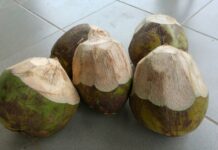Photo credit: DiasporaEngager (www.DiasporaEngager.com).
Farmers are the custodians of the land. But to do fulfill their role crops need to generate income.
“Farmers had no choice. They were using varieties that did not meet market requirements or were using old European varieties that would have a lot of disease problems and high levels of pesticide use,” according to Mike Robinson of the Syngenta Foundation for Sustainable Agriculture (SFSA).
Eight years ago, the SFSA brought the International Potato Center (CIP) together with HZPC, the world’s leading commercial potato breeding company, to develop potato varieties adapted to tropical environments. Last year this public-private partnership known as TAP5 registered its first breed, called HCIP210 in Vietnam. According to Robinson, “the best is still to come.”
13 years, that is how long it takes to develop a potato breed from scratch, however HCIP210 was registered in less than eight years from crossing. Not only is the speed record-breaking. The variety is the first ever commercial breed well adapted to the tropics with higher yields in the agroecologies challenged by poverty, heat, drought, and diseases.
While its name sounds technical, HCIP210 carries profound implications. Most smallholders live in the tropics. Many of these farmers use varieties developed in temperate regions, that need lots of fertilizer, water, and pesticides, but meet market demands in terms of taste and ability to be processed.
For HZPC’s head of Research and Development, Robert Graveland, the new TAP5 variety does not only combine better yield and stability under tropical conditions. By leveraging CIP’s expertise in disease and virus resistance alongside HZPC’s genetic traits tailored for processing and taste, TAP5 has created a variety that is outperforming the European varieties in acceptance for the value chain, making HCIP210 a sustainable option for smallholders as well as a high value cash crop.
This way Dr. Hugo Campos, CIP’s Deputy Director, and Head of Science and Innovation, wants to deliver at scale: “With TAP5, we are doing something quite unique. We are running a commercial breeding programme”. Next to the scientific advancements, the public-private partnership delivers complete, market-ready products that enable sustainable agriculture with fewer inputs and higher outputs.
For Campos delivering public goods through public-private partnerships is not just a strategy but a necessity for creating lasting change in agriculture: “Going forward it is very clear to me that we not only need to develop high yielding potatoes that are resistant to late blight and other diseases but also that they have the processing quality which is becoming more and more relevant for smallholder farmers across the globe“.
Source of original article: International Potato Center (cipotato.org).
The content of this article does not necessarily reflect the views or opinion of Global Diaspora News (www.GlobalDiasporaNews.com).
To submit your press release: (https://www.GlobalDiasporaNews.com/pr).
To advertise on Global Diaspora News: (www.GlobalDiasporaNews.com/ads).
Sign up to Global Diaspora News newsletter: (https://www.GlobalDiasporaNews.com/newsletter/) to start receiving updates and opportunities directly in your email inbox for free.
































